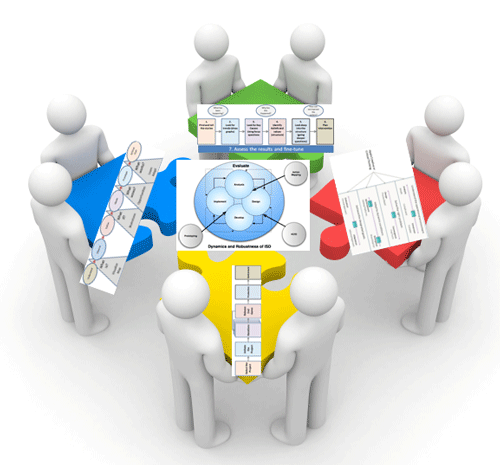With so many design models to choose from, what should I use? To help with the answer I created
a table of five design methodologies that may assist you in choosing a model to start from:
- Instructional System Design
- Design Thinking
- Agile Design
- System Thinking
- X Problems
The table includes their definitions, visual models, primary focus and goals, values, main steps, and further readings (web links). Note that models are only guides on the sides, not sages on the stages, so don't hesitate to mix, match and adapt to help you arrive at a perfect solution to a difficult problem.
Let me know what you think.

7 comments:
Hello, thank you for the thought and effort put intot his and it is a very good visual and compare and contrast. I believe the only thing that would improve this would be to put examples of specific designs in each of your five categories. Of course this is coming from reading and studlying it a bit, not using it yet, but has potential indeed! Thank you
I added a row of examples as you suggested. Let me know if these are what you where looking for.
Hi Don, just a note of encouragement: yours is really good stuff. I'm coming from management, systems thinking, agile; now interested in instructional design.
Hi Don,
that's a great table and comparison :) I see this as a fantastic help for people of different 'schools' to understand each other, their philosophy and their approach.
thanks for sharing
Frank
Great visualisation and comparison. Your summaries use the language that I hear from educators in different disciplines. Expanding on Frank's comment, ADDIE typically seems intuitive to teachers of education. Design thinking is natural to engineers, just as Agile's atomistic, empirical cycles are assumed to be ideal by a number of science educators. Management educators use the language about complexity and chaos in the later two theories, and can be quite dismissive of less "holistic" approaches.
Gebhardt makes a good point. I found the table to be most interesting with respect to the disciplines associated with the various approaches. As a consultative instructional designer, being able to use the processes most familiar to the client to result in an effective course seems to make a lot of sense. I look forward to seeing how you continue to flesh this out and its implications.
hi There, Donald Thank You so much. I am just starting on my journey of discovery into the Instructional Design field. You have put up a LOT of extremely useful Information. Thanks again, I will definitely be back to read some more and to try to make good use of your Information.
Post a Comment